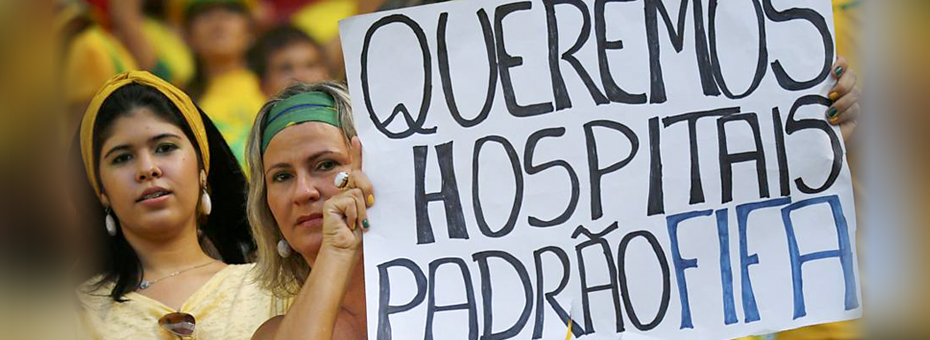Image courtesy of True Faith
On June 12th, hundreds of thousands people all over the world will watch the opening ceremony of the World Cup, a match between Brazil and Croatia in a new stadium in Sao Paulo. The stadium is still under construction. We hope it will be ready in time.
The state will treat June 12th like a holiday. Since much of the infrastructure for sure will not be ready, transportation will be facilitated carefully. The international airport expansion will not be fully operationalized. The reduction in business travels may or may not create bottlenecks. Public safety will likely be guaranteed only by special police forces, some trained in the US. In some ways the situation is similar to the other 11 game city sites. In other ways, this festival of improvisation and workarounds feels so typically Brazilian.
“Preparation for this event is making Brazil’s poor levels of education, health, transportation, and security visible. The government’s struggles with management are visible, too.” |
Seven years ago, when FIFA (Fédération Internationale de Football Association) announced that Brazil had won the bidding process and would host the World Cup, Brazilians celebrated and felt an incredible sense of pride. It was an honor to host the World Cup. This would be an opportunity to showcase to the world what Brazil has to offer.
Many thought this would be the opportunity to elevate Brazil’s status beyond the sport Brazil excels at and Brazilians love. The world might see Brazil had changed, that it can be good at organization and management. Our hope I think was that world exposure would be a good thing. At the time, the Brazilian economy was growing and the government was successfully implementing an ambitious plan to reduce poverty.
Despite all of this hope, there’s a possibility now that there will be public demonstrations in the streets against the World Cup as it’s happening. Protesters will likely include people who otherwise would be watching the match. They’ll demand, among other things, a “FIFA standard” for public health, education, transportation, security etc. The crowd size and noise will depend of the publicity campaign of the government to promote the World Cup as something “good for the country,” hiding or minimizing the problems encountered in the process of hosting the event.
Why will be there protesters? What happened to cause this?
Most stadiums run late on schedule and are over budget, but in Brazil this year, this is an understatement. There remain serious doubts about the reliability of the stadium’s construction, and most World Cup stadiums have no economic feasibility after the games are over. Many tickets for the game aren’t even available yet because it hasn’t been decided yet how many seats there will be in the stadium. We know most of the public transportation investments (airports, trains, subways, roads, access to the stadiums etc.) will not be ready. Despite good employment levels and reasonable economic conditions, public security is worsening. The state promised not to spend public money on the World Cup, but most investments have been publically funded. So many things that remain up in the air that could damage Brazil’s image. I could go on and on with the list of things that have gone wrong and are going wrong still.
So, as you can imagine, instead of wide spread enthusiasm and excitement, much frustration is present in Brazil, particularly among the urban and educated. The World Cup has exposed failures and weaknesses that have existed for many years, but never been so visible.
Preparation for this event is making Brazil’s poor levels of education, health, transportation, and security visible. The government’s struggles with management are visible, too. We’ve seen this from the massive demonstrations in major cities.
The Emergence of a “FIFA Standard”
Football is a huge business that mobilizes billions of dollars and engages emotionally billions of people. FIFA, an association founded in 1904 and headquartered in Zurich Switzerland, manages lucrative contracts with hundreds of global companies who want to sponsor its activities and advertise their brands. FIFA brings together 208 national associations in various countries and holds many events such as the UEFAs clubs championship, Women’s World Cup, etc. For the World Cup, FIFA defines a standard for most of the important things you’d expect of a stadium: the comfort of spectators, the quality and shape of the grass, lighting, parallel events outside the stadiums, lodging for teams, the level and quality of TV transmission, etc.
We’ve never seen such a standard here before. Brazil’s local championships are usually played in empty, moribund stadiums commonly filled with gangs more interested in fighting than anything else. So these FIFA standards have been a good thing, and Brazil is struggling hard to adopt these new standards. Some are beginning to think these kinds of service standards should be spread to public services, which are currently thought to be terrible.
What Are We Learning?
Lean tells us that if problems are not identified and defined, if there is no root cause analysis, no learning occurs. As a result of Brazil’s poor educational system, we have struggled to develop good problem solvers. Rarely do we see things like the clear recognition of problems, root cause analysis, active cycles of PDCA learning. Most of the time we just see the same problems happen again and again.
A recent international test done by The Programme for International Student Assessment (PISA), part of a project of the The Organisation for Economic Co-operation and Development (OECD), focused specifically on assessing practical everyday problem solving skills by students. A group of 85,000 students from 44 countries were evaluated. For Brazil, the result was very disappointing. Our students were in 38th place. Our students are need help solving problems. Singapore, South Korea, and Japan took the top three slots. (Notice these are countries with aggressive education policies).
One of our key ministers here in Brazil, Minister Gilberto Carvalho, now has the responsibility to drum up support of the World Cup. His job is to promote positive thinking and public acceptance of the event. When asked about some of the projects and services that won’t be ready in time, Carvalho has said, “It does not matter, what’s important is that they are finished. If not in June, then in November, December.” We are told the same thing again and again.
With the Olympics set to be held in Rio de Janeiro in 2016, you might imagine Brazil would learn from the World Cup planning process about what needs to be done differently next time. Not so. Major signs of concern are already in the horizon. So in early April, the International Olympic Committee decided to intervene. The construction is late, deadline after deadline is being missed, so they are right to intervene. Then the president of the Brazilian Olympic Committee, the party responsible for the organization of the Olympic games, an outsider whose previous professional experience came from running one of Brazil largest steel companies—he resigned without any public explanation.
Dilma Rouseff, Brazil’s current president, was promoted a candidate as being a “good manager”. After multiple examples of poor management, maybe more people in Brazil and far beyond Brazil will become aware of what good management really means. People want FIFA standards. Everywhere. And still, most Brazilians are friendly and will try to make a festive event for all the thousands of visitors plus the millions who will watch on TV and the internet.
“After multiple examples of poor management, maybe more people in Brazil and far beyond Brazil will become aware of what good management really means.” |
It takes time and many generations to change a country and a culture. Our Portuguese roots have shaped the developed of our national culture which influences management values and practices. Part of the change process is just the awareness of the existence of a better standard and recognizing we are below standard. What we need is design a future state, create consensus around it, and move to action.
There are a few examples of well-managed companies and sites in Brazil, some of these companies are even lean. I believe the practical experiences of a great number of people within those private companies where “most things work”—this is what will influence the conscience of people for those things that don´t. Not the chaos we have witnessed in the World Cup, an event currently held in the public sector domain. But there only a few private companies that are setting a good example. As a lean business community, we have to do more.
The World Cup 2014 may not be a totally lost opportunity because at least it has raised the awareness of those “things that don’t work, but should.” We are getting a feel for how much we need standards and what management could and should be.
I’m reminded of a catastrophe that happened in 1950 when Brazil was the favorite to win the World Cup (held in Brazil then as well) and we lost the final match to Uruguay. If Brazil loses this year to our neighbor Argentina—who has some of the world´s best players but lacks organization as well—the feelings will be sour. Reflection and learning might come about, but the most painful way: a dramatic loss in the football field.
Let’s hope this will not be necessary to improve Brazil’s management capabilities.





